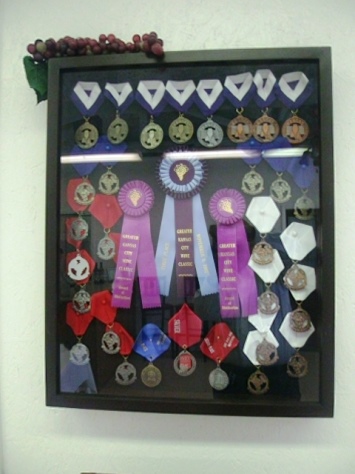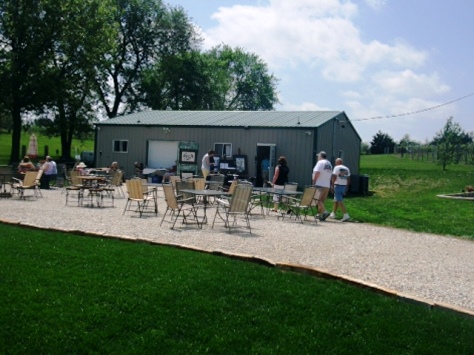Piper neighborhood residents protest mom-and-pop winery’s music
by Mary Rupert
The Wine Barn lost its live entertainment special use permit Thursday night after neighbors protested about noise.
Now, the small business in Kansas City, Kan., is considering closing, according to Celeste Mikijanis, who owns the business with her husband, Brian.
The small mom-and-pop winery is at 2850 N. 119th St., Kansas City, Kan., in the Piper area. It is a tourist spot in Wyandotte County that is listed on the state of Kansas’ agribusiness tourism website.
It was still open this past weekend to sell wine, but events with music are no longer allowed.
“Live music events were a very significant portion of our business and made up at least 40 percent of our income,” Mikijanis said on Saturday. “What’s going to happen in our business is we’re going to close because of it. They said ‘you can still sell wine.’ That’s like saying to a hair salon, ‘You can cut hair and not color it.’”
While the Wine Barn could still stay open, that may not be a wise long-term business decision, she said. The income from it probably would not support a family, and the winery couldn’t compete with other wineries, she added.
For the immediate future, the Wine Barn doesn’t have a timeline for closing, she added. She plans to have a meeting with her parents, who are business partners, and figure out where to go from here, she said.
The Wine Barn, built in 2008, opened as a commercial farm winery in 2009, and started holding music events in 2010. It had been holding live music events for three years before a new resident moved in, who spoke against it at the recent UG meeting.
The restrictions placed on live music cover just about all sorts of music that would be offered, including live bands and music with disc jockeys, according to the UG. It also covers music at weddings and receptions.
Mikijanis said the Wine Barn did everything that was required of them, including keeping the music level down, controlling the type of music, hiring off-duty police officers to witness the music decibel levels, and picking up trash on the street.
A substantial amount of their own money was invested in their business, she added.
“This was set to be my kids’ future and retirement, and it’s been taken away because of one person complaining,” Mikijanis said. “It’s just not right.”
Neighbors protest noise levels
A protest petition was filed about the noise, and two residents appeared at the Unified Government Commission meeting Jan. 28 to speak against the permit for live music. Previously, the UG Planning Commission had voted 5-2 to deny the permit for live music, and the UG staff had recommended denial.
Neighbors claimed the music was too loud. A neighbor made a video of what they called noise and other issues, and it was shown at the meeting. Three neighbors signed the protest petition, which made up 40 percent of the nearby residents.
Anne Seeberger, 2810 N. 119th St., who lives nearby, said persons drive through the neighborhood, sometimes to her driveway, and occasionally park in her yard. She is a Unified Government employee working for the Kansas City, Kan., Fire Department.
“There’s beer cans all over that street right now,” she said at the meeting. Also, liquor bottles are thrown in the street, she added.
She said there are safety concerns because people spend long, extended periods of time at a drinking place and are on a dark, narrow street in a residential area.
Also speaking against it was Larry Reynolds, another neighbor. He said it was the fourth or fifth time the neighbors had been to planning and zoning meetings, and he disputed that there was 100 percent compliance.
“I moved out there to be in a quiet neighborhood, with acreage, with no intention that somebody was going to be playing music,” Reynolds said. “I don’t mind the neighbors, I just don’t like the music. I just don’t think it’s fair for the neighbors that are there.”
“I don’t think it’s fair just because somebody wants to make money, that the rest of us around there have to suffer,” Reynolds said.
Commissioners learned that a former agreement among the neighbors fell apart when Sal Coco, a next-door neighbor to the Wine Barn, and a former co-owner and supporter of it, sold his home to a new owner, Seeberger. The new owner led a petition drive against the noise, with the help of some of the other neighbors. Those speaking for the Wine Barn said the home’s new owners knew about the special use permit and music when they bought the property.
Appearing in support of the Wine Barn were the owners, as well as Sal Coco (who was a previous co-owner), the director of a business group, the owner of the nearby Rowe Ridge Winery, and attorney Ryan Denk.
Mark Rowe, who owns the Rowe Ridge Winery nearby on Leavenworth Road, during the UG meeting said he talked with the people who bought the property next door before they bought it, and he made sure he told them there was live music every Friday night or whatever nights scheduled. Events are important to the Wine Barn’s business.
“The point of it being, is it controls their business plan for their business,” Rowe said. “I just came from a statewide conference in Manhattan for Kansas grape growers and wineries. We’ve all had these problems. Some are different than others as we go along. But one thing we found, to get the people out and the families out and to let them enjoy it, is the live music. They really seem to enjoy it. Wine is a social thing.
“Let them build their business plan and let them run their business. It’s a family business, this is generational now,” Rowe said.
Many nonprofit benefits have been held at the Wine Barn in the past several years.
Murrel Bland, executive director of Business West, spoke in favor of the 10-year special use permit. Business West had benefit events there, he said.
“It speaks to the quality of life, and it’s an asset to the community,” he said.
UG Commissioners Melissa Bynum and Jane Philbrook said they had attended meetings of the Kiwanis Club and Business West at the Wine Barn, during the past year, and they didn’t think those meetings were loud at all.
The owner of the Wine Barn said live entertainment was essential for the business’s operation.
The Wine Barn is in the Fifth District, represented by Commissioner Mike Kane. Kane said he was tired of the same issue being brought back to the UG commission. It had been there numerous times previously, he said.
Some commissioners wanted to get the two sides together again to meet and work out their differences, but after talking to each of them at the meeting, the commissioners felt they were too far apart to come to an agreement.

Zoning
The Wine Barn is located on North 119th between Leavenworth Road and Parallel Parkway. It is zoned agricultural, according to UG information, and around it are expensive properties, suburban residences on large lots.
The Wine Barn is a farm on 15.2 acres that grows grapes and produces wine. Like a lot of farm wineries, it holds special events with music to produce income.
Surrounding the Wine Barn on three sides are residences with acreage, and on the east side, a large acreage. The master plan for the area says it is in a suburban residential area.
Except for a sign marking the entrance, those who drive through the neighborhood would see nothing of the Wine Barn from the street. It is set back far from the road, with trees surrounding a small narrow drive.
Under state law, according to UG officials, the Wine Barn and other wineries do not need a local permit to operate. But they need a special use permit for live entertainment concerning noise.
Rob Richardson, UG planning director, at the commission meeting said “the subject of the live entertainment has been at issue for some time.” He said there were about 13 to 14 issues with the permit.
Last year, the UG placed stipulations on the Wine Barn concerning the loudness of music and the number of events, along with other items.
Previously they had talked about a closed back at the stage area to direct the sound toward the lake, Commissioner Brian McKiernan mentioned. Richardson said instead they decided to take a sound decibel reading at a point at the Reynolds’ property. McKiernan pointed out that a wraparound back and side to the stage would mitigate the noise levels.
“I invite you to come down to my neighborhood, we’ve got more noise than that on a quiet night,” Commissioner McKiernan remarked.
At the UG meeting, Richardson said he earlier recommended denial, and the planning commission voted for denial, largely because the video showed rock music being played, and the stipulations said there could be no rock music. Another reason concerned a fence, and a portion of it that was not constructed, he said.
At the meeting, the two sides did not agree on some of the basic facts discussed, including whether the music was too loud, and also how many events were held.
Commissioner Kane, at the meeting, said two families had moved in the past because of it, and he had received calls in the past about it. There had been meetings between the neighbors and the owners, and an agreement had been worked out in the past, but apparently it was not working out. He said there was a “non-trust factor on both sides.”
Commissioner Ann Murguia said on these planning issues, she often votes the same way as the commissioner in whose district the business is located. “I don’t think anybody wins when neighbors fight with one another, and not when you put government in charge of resolving those disputes,” she said. She suggested sending it back to the Planning Commission for more work, but said she would defer to the commissioner in whose district it was located.
She added that like Commissioner McKiernan, she lives in the city and this noise would be a normal day for them, and that 14 events a year are not very much compared to that.
Commissioner Bynum, the 1st District at large commissioner, which also includes the area of the Wine Barn, said she was at two of the events, including a Kiwanis event and a Business West event. She pointed out that the decibel levels were being monitored by the off-duty police officers.
“I wouldn’t deliberately attend a gathering someone would call disruptive,” Commissioner Bynum said. “In my estimation they were rather quiet gatherings and very delightful gatherings.”
“Sometimes you cannot make people like each other, you cannot make people get along, no matter how we would like that to happen,” Commissioner Jane Philbrook said. “I worked long and hard at this and so did everybody else, trying to get it set up so everybody could live well together, and it just doesn’t seem to be working. I was also at two of those gatherings deemed to be disruptive. I didn’t feel disruptive, we didn’t have music and it wasn’t loud.”
Commissioner Hal Walker, 2nd District at large commissioner, pointed out that he also represents that area since he is elected countywide, and said he didn’t see any evidence for not granting the special use permit. He was in favor of extending the permit for a long period of time.
“Define a rock band for me,” Commissioner Walker said. “How do you differentiate ZZ Top from Led Zeppelin?
“There’s fundamental problems here. I’m not seeing a preponderance of evidence of violation,” Commissioner Walker said, referring to the situation as “Hatfield and McCoy.”
The vote was 7-2 with Commissioner Kane, Angela Markley, Ann Murguia, Jane Philbrook, Gayle Townsend, Brian McKiernan and Harold Johnson voting in favor of denial of the permit, and Commissioners Melissa Bynum and Hal Walker voting against denial of the permit.

An indoor events building
The Wine Barn had been requesting a 10-year permit because it wanted to get a loan to construct a building to hold events indoors, Mikijanis said. That could have solved complaints about music levels.
A banker told her that she could not get a loan unless she had a long-term 10-year permit, not the one-year or five-year permits that the UG was granting, she said.
Since Thursday night, a lot of people have said she could move the business to Johnson County or Leavenworth County, Mikijanis said.
But the grape vines were planted in 2000, and have been here 16 years.
“You just can’t up and pick up your grape vines and move,” Mikijanis said on Saturday. “This is my county, I grew up here and spent my whole life here. This is why I built here, not in Johnson County because I wanted a winery. I built in Wyandotte County because I wanted a business in Wyandotte County. This is my home and now I’m being pushed out.”
To see a video of the UG Commission meeting, visit youtube.com and search under “Unified Government,” for Jan. 28. https://www.youtube.com/watch?v=NJZgEoODfTk

